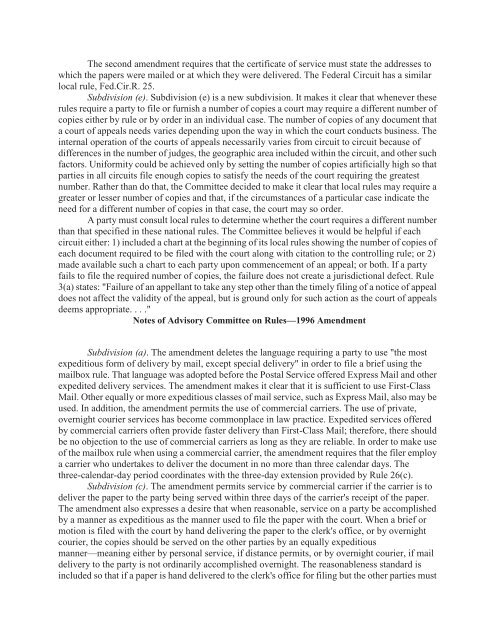Federal Rules of Appellate Procedure 2014-2015, 2014a
Federal Rules of Appellate Procedure 2014-2015, 2014a
Federal Rules of Appellate Procedure 2014-2015, 2014a
You also want an ePaper? Increase the reach of your titles
YUMPU automatically turns print PDFs into web optimized ePapers that Google loves.
The second amendment requires that the certificate <strong>of</strong> service must state the addresses to<br />
which the papers were mailed or at which they were delivered. The <strong>Federal</strong> Circuit has a similar<br />
local rule, Fed.Cir.R. 25.<br />
Subdivision (e). Subdivision (e) is a new subdivision. It makes it clear that whenever these<br />
rules require a party to file or furnish a number <strong>of</strong> copies a court may require a different number <strong>of</strong><br />
copies either by rule or by order in an individual case. The number <strong>of</strong> copies <strong>of</strong> any document that<br />
a court <strong>of</strong> appeals needs varies depending upon the way in which the court conducts business. The<br />
internal operation <strong>of</strong> the courts <strong>of</strong> appeals necessarily varies from circuit to circuit because <strong>of</strong><br />
differences in the number <strong>of</strong> judges, the geographic area included within the circuit, and other such<br />
factors. Uniformity could be achieved only by setting the number <strong>of</strong> copies artificially high so that<br />
parties in all circuits file enough copies to satisfy the needs <strong>of</strong> the court requiring the greatest<br />
number. Rather than do that, the Committee decided to make it clear that local rules may require a<br />
greater or lesser number <strong>of</strong> copies and that, if the circumstances <strong>of</strong> a particular case indicate the<br />
need for a different number <strong>of</strong> copies in that case, the court may so order.<br />
A party must consult local rules to determine whether the court requires a different number<br />
than that specified in these national rules. The Committee believes it would be helpful if each<br />
circuit either: 1) included a chart at the beginning <strong>of</strong> its local rules showing the number <strong>of</strong> copies <strong>of</strong><br />
each document required to be filed with the court along with citation to the controlling rule; or 2)<br />
made available such a chart to each party upon commencement <strong>of</strong> an appeal; or both. If a party<br />
fails to file the required number <strong>of</strong> copies, the failure does not create a jurisdictional defect. Rule<br />
3(a) states: "Failure <strong>of</strong> an appellant to take any step other than the timely filing <strong>of</strong> a notice <strong>of</strong> appeal<br />
does not affect the validity <strong>of</strong> the appeal, but is ground only for such action as the court <strong>of</strong> appeals<br />
deems appropriate. . . ."<br />
Notes <strong>of</strong> Advisory Committee on <strong>Rules</strong>—1996 Amendment<br />
Subdivision (a). The amendment deletes the language requiring a party to use "the most<br />
expeditious form <strong>of</strong> delivery by mail, except special delivery" in order to file a brief using the<br />
mailbox rule. That language was adopted before the Postal Service <strong>of</strong>fered Express Mail and other<br />
expedited delivery services. The amendment makes it clear that it is sufficient to use First-Class<br />
Mail. Other equally or more expeditious classes <strong>of</strong> mail service, such as Express Mail, also may be<br />
used. In addition, the amendment permits the use <strong>of</strong> commercial carriers. The use <strong>of</strong> private,<br />
overnight courier services has become commonplace in law practice. Expedited services <strong>of</strong>fered<br />
by commercial carriers <strong>of</strong>ten provide faster delivery than First-Class Mail; therefore, there should<br />
be no objection to the use <strong>of</strong> commercial carriers as long as they are reliable. In order to make use<br />
<strong>of</strong> the mailbox rule when using a commercial carrier, the amendment requires that the filer employ<br />
a carrier who undertakes to deliver the document in no more than three calendar days. The<br />
three-calendar-day period coordinates with the three-day extension provided by Rule 26(c).<br />
Subdivision (c). The amendment permits service by commercial carrier if the carrier is to<br />
deliver the paper to the party being served within three days <strong>of</strong> the carrier's receipt <strong>of</strong> the paper.<br />
The amendment also expresses a desire that when reasonable, service on a party be accomplished<br />
by a manner as expeditious as the manner used to file the paper with the court. When a brief or<br />
motion is filed with the court by hand delivering the paper to the clerk's <strong>of</strong>fice, or by overnight<br />
courier, the copies should be served on the other parties by an equally expeditious<br />
manner—meaning either by personal service, if distance permits, or by overnight courier, if mail<br />
delivery to the party is not ordinarily accomplished overnight. The reasonableness standard is<br />
included so that if a paper is hand delivered to the clerk's <strong>of</strong>fice for filing but the other parties must


















